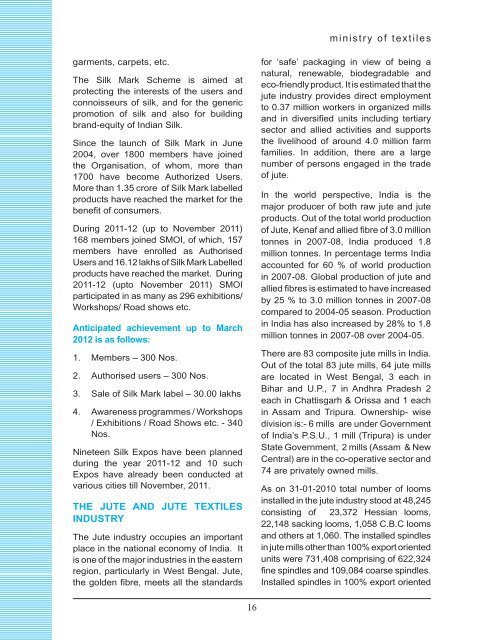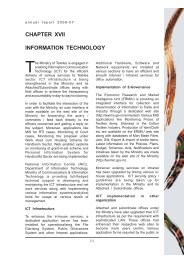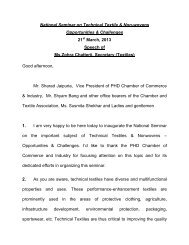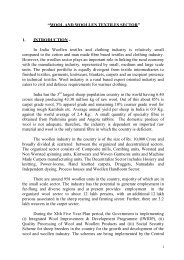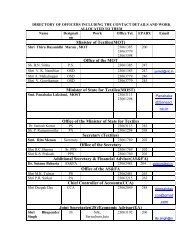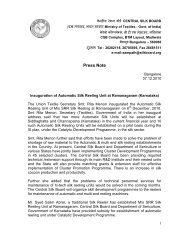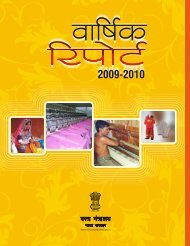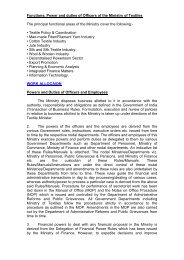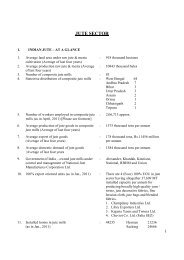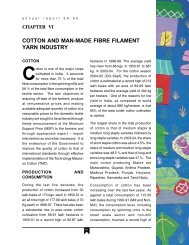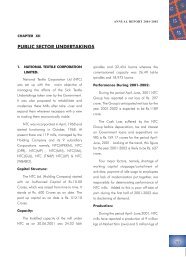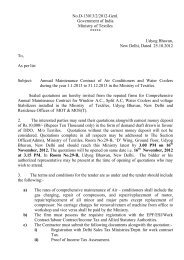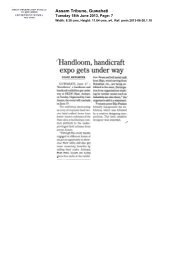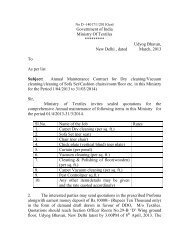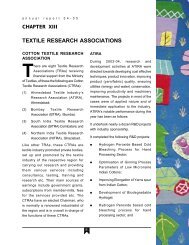chapter viii wool & wollen textiles industry - Ministry of Textiles
chapter viii wool & wollen textiles industry - Ministry of Textiles
chapter viii wool & wollen textiles industry - Ministry of Textiles
You also want an ePaper? Increase the reach of your titles
YUMPU automatically turns print PDFs into web optimized ePapers that Google loves.
ministry <strong>of</strong> <strong>textiles</strong><br />
garments, carpets, etc.<br />
The Silk Mark Scheme is aimed at<br />
protecting the interests <strong>of</strong> the users and<br />
connoisseurs <strong>of</strong> silk, and for the generic<br />
promotion <strong>of</strong> silk and also for building<br />
brand-equity <strong>of</strong> Indian Silk.<br />
Since the launch <strong>of</strong> Silk Mark in June<br />
2004, over 1800 members have joined<br />
the Organisation, <strong>of</strong> whom, more than<br />
1700 have become Authorized Users.<br />
More than 1.35 crore <strong>of</strong> Silk Mark labelled<br />
products have reached the market for the<br />
benefit <strong>of</strong> consumers.<br />
During 2011-12 (up to November 2011)<br />
168 members joined SMOI, <strong>of</strong> which, 157<br />
members have enrolled as Authorised<br />
Users and 16.12 lakhs <strong>of</strong> Silk Mark Labelled<br />
products have reached the market. During<br />
2011-12 (upto November 2011) SMOI<br />
participated in as many as 296 exhibitions/<br />
Workshops/ Road shows etc.<br />
Anticipated achievement up to March<br />
2012 is as follows:<br />
1. Members – 300 Nos.<br />
2. Authorised users – 300 Nos.<br />
3. Sale <strong>of</strong> Silk Mark label – 30.00 lakhs<br />
4. Awareness programmes / Workshops<br />
/ Exhibitions / Road Shows etc. - 340<br />
Nos.<br />
Nineteen Silk Expos have been planned<br />
during the year 2011-12 and 10 such<br />
Expos have already been conducted at<br />
various cities till November, 2011.<br />
THE JUTE AND JUTE TEXTILES<br />
INDUSTRY<br />
The Jute <strong>industry</strong> occupies an important<br />
place in the national economy <strong>of</strong> India. It<br />
is one <strong>of</strong> the major industries in the eastern<br />
region, particularly in West Bengal. Jute,<br />
the golden fibre, meets all the standards<br />
for ‘safe’ packaging in view <strong>of</strong> being a<br />
natural, renewable, biodegradable and<br />
eco-friendly product. It is estimated that the<br />
jute <strong>industry</strong> provides direct employment<br />
to 0.37 million workers in organized mills<br />
and in diversified units including tertiary<br />
sector and allied activities and supports<br />
the livelihood <strong>of</strong> around 4.0 million farm<br />
families. In addition, there are a large<br />
number <strong>of</strong> persons engaged in the trade<br />
<strong>of</strong> jute.<br />
In the world perspective, India is the<br />
major producer <strong>of</strong> both raw jute and jute<br />
products. Out <strong>of</strong> the total world production<br />
<strong>of</strong> Jute, Kenaf and allied fibre <strong>of</strong> 3.0 million<br />
tonnes in 2007-08, India produced 1.8<br />
million tonnes. In percentage terms India<br />
accounted for 60 % <strong>of</strong> world production<br />
in 2007-08. Global production <strong>of</strong> jute and<br />
allied fibres is estimated to have increased<br />
by 25 % to 3.0 million tonnes in 2007-08<br />
compared to 2004-05 season. Production<br />
in India has also increased by 28% to 1.8<br />
million tonnes in 2007-08 over 2004-05.<br />
There are 83 composite jute mills in India.<br />
Out <strong>of</strong> the total 83 jute mills, 64 jute mills<br />
are located in West Bengal, 3 each in<br />
Bihar and U.P., 7 in Andhra Pradesh 2<br />
each in Chattisgarh & Orissa and 1 each<br />
in Assam and Tripura. Ownership- wise<br />
division is:- 6 mills are under Government<br />
<strong>of</strong> India’s P.S.U., 1 mill (Tripura) is under<br />
State Government, 2 mills (Assam & New<br />
Central) are in the co-operative sector and<br />
74 are privately owned mills.<br />
As on 31-01-2010 total number <strong>of</strong> looms<br />
installed in the jute <strong>industry</strong> stood at 48,245<br />
consisting <strong>of</strong> 23,372 Hessian looms,<br />
22,148 sacking looms, 1,058 C.B.C looms<br />
and others at 1,060. The installed spindles<br />
in jute mills other than 100% export oriented<br />
units were 731,408 comprising <strong>of</strong> 622,324<br />
fine spindles and 109,084 coarse spindles.<br />
Installed spindles in 100% export oriented<br />
16


